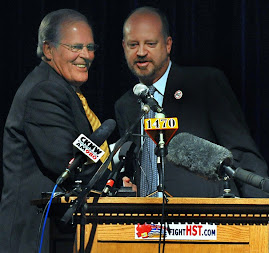Unproven court document allegations
another reason why calls for a public inquiry will only grow louder.
Bill Tieleman’s 24
Hours Vancouver / The Tyee column
Tuesday
June 23, 2015
By Bill Tieleman
I
don't want the truth. I want something I can tell the Parliament!"
-
Cabinet Minister James Hacker in Yes Minister
Premier
Christy Clark's refusal to call a public inquiry into the B.C. government's
admittedly wrongful firing of eight health ministry researchers and contractors
-- and what the BC NDP alleges was a cover up -- is already a bad decision.
What
makes it worse is that now many questions are being asked about why the
government would refuse to forward information to the RCMP for an investigation
for so long the police closed the file -- something the BC Liberals never
admitted to until a freedom of information request disclosed it.
Why
were those people fired and publicly tarred and feathered by government -- only
to later see most of them rehired or compensated for wrongful dismissal?
One
researcher -- Roderick MacIsaac -- was so distressed with his reputation being
destroyed that he sadly took his life.
So
what was so important for the government to take this extreme action and then
risk covering their tracks -- claiming there was an "ongoing police
investigation" when actually they wouldn't give the RCMP files to examine?
The
most damaging allegation -- contained in a defamation lawsuit claim
by fired contractor William Warburton -- is explosive.
Warburton
charged
in 2013 that the firings were motivated by the government's need to protect the
interest of big pharmaceutical companies who were also major donors to the BC
Liberal Party.
"The
province's acts against Dr. Warburton are part of a bad-faith program by the
defendants to end the investigation of harmful effects of drugs which risk
leading to diminishing payments to their political contributors, and constitute
misfeasance in public office as the defendants were aware that their deliberate
acts against Dr. Warburton were illegal and would likely harm him," court
documents say.
The government hotly denied those allegations in response to Warburton's statement of claim -- and nothing has been examined or proven in court to date. Warburton's defamation case continues.
But
the lack of a public inquiry means theories like Warburton's can make as much
as sense as any -- until testimony under oath is heard.
Warburton's
court filing lists several major pharmaceutical companies as making "very
profitable drugs" that he was investigating as to their effectiveness,
including possible side effects.
His
studies, Warburton claimed, "had the potential of disrupting financially
significant payments to large pharmaceutical companies, many of who were major
contributors to the Liberal Party..."
Warburton's
court document then lists several firms, including: Novartis Pharmaceuticals
Canada; Janssen Inc.; AstraZeneca Canada Inc.; and Eli Lilly Canada Inc.
The
donation record
A
search of Elections BC financial donation records
shows the following total contributions to the BC Liberal Party and its
candidates were made between 2005 and 2015:
Novartis
Pharmaceuticals Canada: $25,894
Pfizer
Canada Inc.: $41,277
Janssen
Inc. & Janssen-Ortho Inc.: $31,734
AstraZeneca
Canada Inc.: $12,698
Eli
Lilly Canada Inc.: $6,323
In
addition, Canada's Research-Based Pharmaceutical Companies -- an umbrella group
-- is recorded by Elections BC as contributing $27,908 to the BC Liberals in
the same period.
And
the BC NDP -- which is calling for a public inquiry -- has previously hammered
the BC Liberal government for attempting to eliminate the independent research
Therapeutics Initiative program, which evaluates the effectiveness of
pharmaceuticals and has saved the province millions of taxpayer dollars and hundreds
of lives.
In
2008 a task force
the government created -- with at least five of its nine members having close
pharmaceutical industry connections -- recommended the Therapeutics Initiative
be shut down.
The president of Canada's Research-Based Pharmaceutical Companies was among those appointed. The Therapeutics Initiative survived the report.
The president of Canada's Research-Based Pharmaceutical Companies was among those appointed. The Therapeutics Initiative survived the report.
But
it should be noted that the BC NDP received $1,475 from the Canada's
Research-Based Pharmaceutical Companies and also contributing to the BC NDP
from 2005 to 2015 were: Novartis Pharmaceutical Canada Inc. - $6,075; Janssen
Pharmaceuticals Inc - $5,550; Pfizer Canada Inc. - $645; and Eli Lilly Canada -
$425.
And
the amount of total donations from "big pharma" to the BC Liberal
Party at $145,834 is far from the largest compared to the $1,088,104 donated by
the New Car Dealers Association of BC or the $607,638 they got from Bosa
Development and related firms or the $353,945 from developer Peter Wall or the
$241,350 they received from real estate mogul Bob Rennie, for example. But
neither is it insignificant.
BCers
want the truth
Again
-- none of Warburton's allegations have been tested or proven in court and have
been rejected expressly by the B.C. government.
But
if nothing else, the fact that pharmaceutical companies are named in a legal
filing by one of the fired health researchers would in itself be good reason
for a public inquiry to clear the air and find out what really happened.
And
that the B.C. government wrongly fired and tarnished its own researchers,
frustrated any possible police investigation and then covered it all up can
only fuel speculation about what else they might be hiding.
That's
why calls for a public inquiry will only grow louder.
.




















